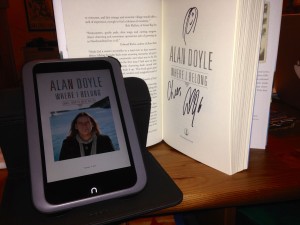 The Spymaster’s Lady by Joanna Bourne
The Spymaster’s Lady by Joanna Bourne
My rating: 3 of 5 stars
I read this one after seeing it lauded on Smart Bitches Trashy Books as a sterling example of an author portraying non-English dialogue very well. Since I’m a language nerd, this was highly relevant to my interests. Didn’t hurt that the plot sounded fun, either–I’m a sucker for the Napoleonic era in general, and this one was all about the spies. I’m finicky in my romance tastes, but historical is one of my go-to genres, and one of the fastest ways to get me to pay attention is to give me a plot involving spies.
In particular, we’ve got our heroine Annique Villiers, a.k.a. the Fox Cub, one of the most infamous spies in France. She starts off our story captured by some of her enemies, who have also captured a couple of British spies. She helps the Brits escape, only to find herself captured by them in turn. The Brits, you see, are every bit as eager as her enemies in France to get their hands on her–because Annique is thought to be in possession of the Albion Plans, a super-secret strategy for how Napoleon is going to invade England.
All very well and good, and at least out of the gate, we’ve got a lot of fun action as Annique, our hero Grey, and Adrian all escape France. But. I’ve got issues with how the story keeps telling us Annique is this awesome master spy–but actually showing us, on camera, a woman who’s continually thwarted by Grey and Adrian. Other characters keep talking about Annique’s intelligence–hell, even Annique herself remarks upon how clever she is a time or two–but what we see on camera is a woman who lets herself be captured twice by Grey. She also walks right into a trap set for her by her French enemies, and has to be rescued from same by the aforementioned Grey. Who, I might add, she does not recognize partway through the book, due to plot reasons that struck me as awfully convenient and kind of twee. (Suffice to say that I found the Annique at the beginning of the book way more interesting than the one we get halfway through.)
I’ve also got issues with the dubious tactics Grey and his people use to capture her, and how they treat her once they have her. Much is made over Annique’s evident youth, which, along with her on-screen behavior, contradicts this whole claim of her being a master spy. I’m not seeing master spy in her. I’m just not.
The last area I have issues with is the ending, and certain revelations that are made about Annique that I won’t get into because spoilers–but suffice to say that I found them actually a little disappointing, and again, ever so convenient.
And OH YES–others have commented on this, but I will too. The ebook edition has a spectacularly stupid cover, just a standard beefcake hero halfway through taking his shirt off. I very much wish that the ebook would have had the cover on the trade edition instead, the one with an actual woman on it, since that woman looked way more interesting and eye-catching to me as a character than your prototypical Yet Another Half-Shirtless Beefcake Romance Dude.
All of which, taken together, makes it sound like I didn’t like the book. Which is not precisely true. One big thing counterbalances all of the aforementioned issues, and that is this: I love, love, love the author’s ability to portray non-English dialogue in a story written in English. My ability to grasp French grammar is still pretty basic, but it is there, and I have enough of it to have totally heard the flow of the language in Annique’s dialogue whenever she was speaking French in the story. Even though her dialogue was written in English. It was all about the word choices and word placement, and it was a distinct pleasure to read. As an author with not inconsiderable interest in writing Francophone characters in the future, I’ll be learning from the book on how to do their dialogue effectively.
All in all, the things I didn’t like about the book are pretty evenly weighted by the glory that was Bourne’s language choices–and it all averages out to a not necessarily spectacular experience, but one which was pretty okay in the end. Three stars.



